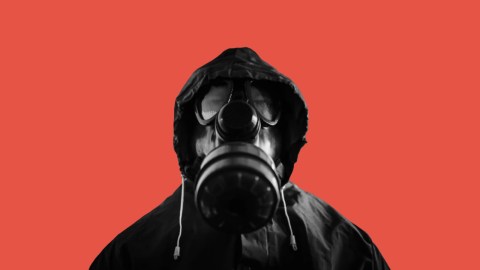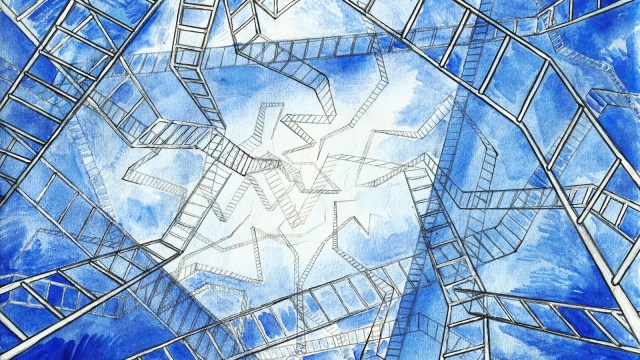Like it or not, we are all “doomsday preppers” to some extent

- Doomsday preppers are those who prepare — and maybe even hope — for apocalyptic scenarios.
- But few households only live with one toilet roll, and we buy more than enough food for today, alone.
- So where is the distinction between prudence and delusional obsession?
Most people look sideways at “doomsday preppers.” Consider this: You walk into someone’s house and see wall-to-wall tins of beans, a huge underground bunker, and an arsenal large enough to invade a small nation. You’d probably make a break for the exit.
“Prepping” is the phenomenon where people prepare — and possibly even hope — for the end of the world. They are the off-grid survivalists who take hoarding to the next level. And, in an age of global pandemics and pariah nuclear states, I bet at least a few of your friends have indulged in a bit of prepping.
The fact is that we are all preppers to some extent. Few households only live with one toilet roll, for instance, and we buy more than enough food for today, alone. We plan and prepare. We stock up on medicines “in case” we get ill. We save up money “for a rainy day,” and we don’t throw away clothes “in case I need it later.” All of which is normal and rational prepping. So, rather than being an either/or situation, prepping is much more of a scale.
The question, then, is when does healthy, sensible prudence become “prepping”? How many tins of beans make a stockpile and when does a basement become a bunker?
A minority affair
After any global pandemic, there’s usually a spike in prepping. In the months after the SARS outbreak in 2003, for instance, the overwhelming majority of households in Hong Kong started to hoard food, medications, and “young children’s necessities.” In the UK, after the so-called swine flu epidemic, a fifth of the population claimed to be prepping up.
Despite these pockets of panic, prepping is still a fairly localized thing. Those who prep often have high anxiety, depression, and distrust others. In 2019, Fetterman et al. showed that prepping is correlated with “paranoia, cynicism, and conspiracy mentality.” It’s something also heavily influenced by your social circles. So, if your uncle keeps loudly telling you that prepping is important, that the end is nigh, and he keeps on buying you four gallons of water every Christmas, then that works its way into your psyche, eventually.
Prepping is a minority pastime for a minority of the population, who are also likely to have underlying mental health issues.
Prepping goes mainstream
That all changed with COVID. As one 2021 study noticed, there was a much more mainstream and generalized increase in “prepping behaviors like stockpiling.” This is probably down to the fact that doomsday predictions and widespread panic were more common. Most of us were locked in our houses, bunkering down, and digesting a news narrative that wouldn’t be out of place in a dystopian movie.
There is, and always has been, a social element to this. As Smith et al. mention, “Stockpiling was mediated by social learning (witnessing other people panic buying).” So, when you see people buying up all of a grocery store’s toilet paper, you feel you should buy “just a few more packs”, as well. When you read in the news that there’s a shortage of baby formula, you make sure you are covered just in case. If a politician says there’s going to be a delay in gas deliveries, you fill up every spare container you have.
And, when we laugh at “panic buyers” in the bar or over dinner, we utterly fail to appreciate the irony of the matter — we are just as much the problem.
I’m not a prepper…am I?
When, then, does prepping become a “problem”? When does buying a few spare things becomes a bit weird? When should your friends become worried about you?
Luckily, one 2018 study developed a test to examine just that. It’s called the Survivalist Behavior Questionnaire (SBQ), and it “was designed from the limited academic literature concerning survivalist strategies and more generally across several survival handbooks.” Its aim is to mix common, or at least socially accepted, prepping — what we’d call “prudence” — with those found in more advanced prepping manuals.
This is how it works: For each of the following eight statements, you give a score from 1 (strongly disagree) to 5 (strongly agree) and tally up your numbers.
1. I have stockpiled food and water to survive a potential major disaster.
2. I have stockpiled weapons to survive a potential major disaster.
3. I have stockpiled equipment and materials to survive a potential major disaster.
4. I regularly think through in my mind ways to survive a potential major disaster.
5. I have thought through who would be in my survival group.
6. I know where I could get more supplies to survive a potential major disaster.
7. I have a plan I could put into operation to survive a potential major disaster.
8. I have attended survival courses to help me get through a potential major disaster.
How’d I do?
Well, the first thing to say is that it’s much more common to talk about or plan something (statements 4, 5, 7, and 8) than actually do it. What’s more, some of these statements are clearly more socially acceptable than others — 1 and 3 are fairly normal but 2 and 8 might raise a few eyebrows. As for 5… well, if you’ve not had that conversation with your friends at least once, I don’t know what you’re doing with your time.
So, what’s the “I’ve got a problem” number? It turns out that the average score across the participants was 19 points. So, if you score less than that, you’re less “prepped” than average. If you score substantially more than that, then, at the very least, that places you as an outlier. At worst, perhaps you need to ask yourself some questions.
Of course, this is not an exact science, and Jackson’s study does acknowledge the correlation between those who score highly and those with other health conditions, like anxiety, paranoia, or depression. Perhaps prepping, like all of those, ought to be seen as a problem only in degree, rather than kind.
Jonny Thomson teaches philosophy in Oxford. He runs a popular account called Mini Philosophy and his first book is Mini Philosophy: A Small Book of Big Ideas.





